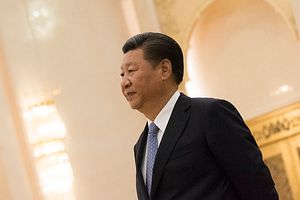Recently, multiple signs have shown that Chinese President Xi Jinping, who also holds the positions of chairman of the Central Military Commission (CMC) — the highest body that controls China’s military — and general secretary of the Chinese Communist Party (CCP) Central Committee, has further consolidated his power over Chinese military.
On December 27, 2017, the CCP Central Committee announced that the Chinese People’s Armed Police Force (PAP), which had been overseen by both the State Council and the CMC since 1982, would be put under the command of the CMC alone from January 1, 2018.
The PAP is currently responsible for domestic stability, civilian policing, border defense, fire rescue, and supporting the military during wartime. From 1966 to 1982 — during the period of China’s Cultural Revolution launched by Mao Zedong — the original PAP was solely controlled by the then-CMC. In 1982 — after Deng Xiaoping issued the “opening up and reform” policy — the Chinese authorities decided to reshuffle the military and transfer part of the power of controlling the paramilitary functions to the government. That was how the current PAP was formally established.
However, the PAP gradually became local governments’ major tool to maintain local stability against unarmed civilians. Some local high officials even deployed the PAP for their personal purposes. One of the most famous — or infamous — examples was during 2012, when Bo Xilai, then-top leader of Chongqing, demanded that his local PAP, along with the police, surround the U.S. consulate in Chengdu in order to arrest then-police chief Wang Lijun. This sensational episode also pulled back the curtain on the impending downfall of Bo himself — one of the most appalling scandals in modern China’s political history.
There was also widespread rumors saying that Zhou Yongkang — China’s ex-security chief, who has been jailed for life in 2015 under the anti-corruption drive launched by Xi — had tried to use his control over the PAP to seize power.
On December 28, 2017, the state newspaper, People’s Daily, published a commentary on its first page, claiming that the move was “a significant political decision that can ensure the party’s absolute leadership over the Armed Police Force.”
“The Central Committee with Comrade Xi Jinping as the core attached great importance to the Armed Police Force and … made the plan from a comprehensive political perspective,” the People’s Daily said. “The People’s Armed Police will remain separate, carry out its existing functions and not be absorbed into the People’s Liberation Army.”
Besides centralizing his control over China’s 660,000-strong PAP, Xi has also appointed a series of military officials to fill in the positions in local provinces in recent weeks.
It has been a tradition for top military officials to also take senior positions in provincial standing committees — the highest decision-making body at the provincial level. However, since Xi launched sweeping military reforms, those positions that used to be saved for military officials had remained unfilled for a whole year, from 2016 to 2017.
Most of these empty positions — in more than 16 provinces across the country — have been suddenly filled in recent weeks, according to the Beijing Daily (Xinjing Bao). Notably, almost all of these military high officials are new to the provincial governments, further indicating that Xi’s reshuffle of the military has been put in place.
As The Diplomat has been following, Xi has been actively enhancing his power in the military since the close of the CCP’s 19th National Congress. He not only shrank the CMC from 11 members to seven but repeatedly demanded “absolute loyalty” from the military. The latest developments signal that his grip on the Chinese military has been tightened even further.

































